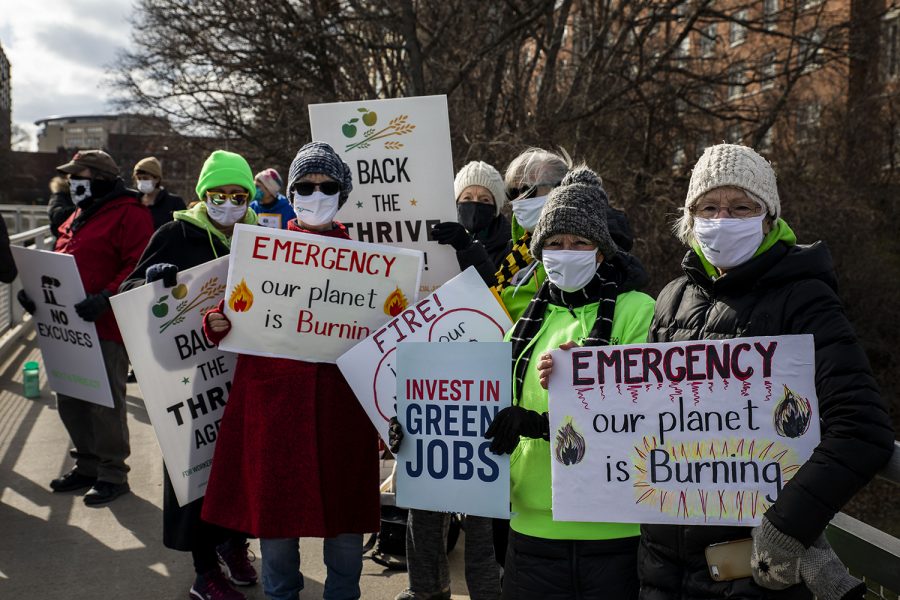Opinion | The need for green economic policy
Carbon dividends and investments in green technology will give us the edge over CO2.
A group of people pose for their portraits and to show their signs on Wednesday, March 31, 2021. Iowa Citizens for Community Change held the rally on the Riverside Dr. overpass.
July 13, 2021
If the government is to ultimately alleviate the repercussions of climate change, it needs to find a way to incentivize people into adopting sustainable practices. Luckily, there is a strategy for this—implementing carbon dividends and increasing investments in clean energy.
In Iowa City, June was the hottest month on record, and July has been anything but colder. Forty percent of the state is in severe drought, which has led to a degradation of crop quality across the board, causing great harm to our agriculture industry.
Furthermore, the increase in frequency of climate-related disasters has caused billions of dollars in damages to Iowa cities as thousands have lost their homes in flash floods. The bottom line is that climate change affects all of us, and we need a solution that works for everyone.
When thinking in terms of economics, carbon dioxide emissions are considered negative externalities as they are social costs that make markets inefficient and the quality of life worse for society.
To combat the negative externality, economists often recommend installing a carbon tax which discourages firms — and people — from polluting the air carbon dioxide, forcing them to look for cleaner ways to produce goods and services.
Despite the fact that case studies have shown that carbon taxes are effective in helping deal with climate change, the politics surrounding them are tricky, as the policy proposal has continuously failed to gain traction amongst the general population, who see the taxes as regressive.
However, if legislators pass a carbon dividend, things could work out differently. Like a carbon tax, a carbon dividend works through levying a fee on polluters. Unlike a carbon tax, however, American families get reimbursed, while polluters do not.
In other words, you are getting paid not to pollute.
One of the more popular plans being discussed in policy circles is the Baker-Schultz climate plan, which would fine firms and individuals $40 per ton of carbon polluted and increase by 5 percent per year above inflation. This would end up cutting emissions by half in 2035 and put $2,000 per year in the pockets of American families, which is a win-win solution for all.
Of course, like any market-based solution, certain climate activists have found climate pricing schemes to be insufficient and are alternatively arguing for the passage of the Green New Deal, a proposition that demands the U.S. revolutionize the economy by becoming a net-zero emitter by 2030.
The problem with the Green New Deal is that there are no actual policy proposals within the plan to combat climate change. Instead, when the authors refer to as “transforming the economy”, they are making vague appeals to increasing access to single-payer health care, ending oppression, and strengthening unions.
While all of these ideas are great, they really do not have any real direct links to mitigating climate change. In contrast, carbon dividends are directly focused on combating the existential crisis.
On the other hand, what the Green New Deal people get right is that we need to make our infrastructure green, which leads into the second part of the strategy for combating climate change.
President Joe Biden’s American Jobs Plan aims to accomplish this by investing billions of dollars in replacing coal power plants with clean ones; incentivizing people to buy electric cars while electrifying public transport; making homes energy efficient; and partaking in environmental conservation.
By investing in green technologies, Biden is hoping to take the first steps for the U.S. to become 100 percent carbon free by 2050, an ambitious yet practical goal that is within reach.
There is no quick fix for climate change. We are now dealing with the repercussions of unchecked pollution that humans have caused over the last 200 years. Fortunately, we do have the necessary solutions for solving this crisis. Our lawmakers just have to be bold enough to implement them.
Columns reflect the opinions of the authors and are not necessarily those of the Editorial Board, The Daily Iowan, or other organizations in which the author may be involved.



